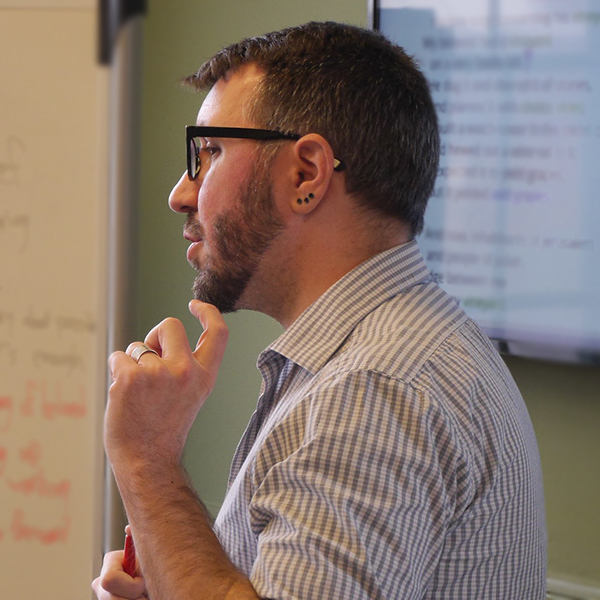Hi, I’m Dr. Bret.
Read my full interview with Melissa Powell in The Torch magazine: Learning Without Limits (2024, pp. 16-19).
My Florida State University homepage is here.
The Research & Exploration of Context-Aware Self-Teaching (RECAST) team website is here.
I am an Assistant Professor of Instructional Systems & Learning Technologies at Florida State University and the Educational Research Catalyst for the FSU Innovation Hub. My preferred pronouns are he/him/his.
My research investigates self-directed learning: how people figure things out on their own using artificial intelligence (AI), the internet, and games. I’m most interested in what happens when students, learners, and trainees finish formal instruction, preparation, and training. What do they do after they walk out the door or log off? How do they continue to develop their knowledge, skills, and abilities? Where do they look for resources? Who do they talk to?
I frequently explore self-directed learning with the tools of educational data science, including learning analytics, social network analysis, natural language processing, and data mining.
As Educational Research Catalyst for the FSU Innovation Hub, I examine the broader educational impacts of hands-on, experiential-learning programs. I approach the processes that occur during intensive events at the Hub, such as Hackathons, Design Sprints, and Game Jams, as a microcosm of learning and making in everyday life as innovation, human intelligence, and artificial intelligence converge.
My academic training spans educational technology (Ph.D., M.A.), educational psychology (Ph.D.), serious games (Graduate Certificate), sociology (B.A.), and mathematics (B.A.).
I consider my strongest credential to be my ongoing friendship with my very first online friend, who I met in an AOL chatroom in the early 1990s.

Roles and Skills
Researcher: Design of Inquiry + Data Analytics
Educator: Design of Instruction + Facilitation
Consultant: Design Thinking + Systems Thinking
Research Interests: Self-Directed Learning (SDL)
-
SDL Processes
- Context-Aware Self-Teaching (CAST)
- Start + Practice + Assess
- Teachers, Game developers, Healthcare workers
- Context-Aware Self-Teaching (CAST)
-
SDL Sites
- SDL in and through Intensive Events
- Hackathons, design sprints, and game jams
- SDL in Networked Knowledge Spaces
- Online communities
- Knowledge repositories
- SDL in and through Intensive Events
Research Methods: Educational Data Science (EDS)
-
Qualitative Inquiry
- Interviews
- Case Study
-
Quantitative Inquiry
- Learning Analytics
- Social Network Analysis + Epistemic Network Analysis
- Educational Data Mining + Web Scraping
- Natural Language Processing
Education
- Ph.D. in Educational Psychology & Educational Technology | Michigan State University (2021)
- M.A. in Educational Technology | Michigan State University (2015)
- Graduate Certificate in Serious Game Design & Research | Michigan State University (2014)
- B.A. in Mathematics & Sociology | Bucknell University (2003)
Training
- Perspectives | Constructive Dialogue Institute (2025)
- Applying the QM Rubric | Quality Matters (2022)
- Data Science: Foundations Using R Specialization | Coursera, Johns Hopkins University (2017-2020)
- Methods for Analyzing & Modeling Textual Data | Summer School Series on Methods for Computational Social Science (2018)
Professional Affiliations
- AECT | Association for Educational Communications & Technology
- Research & Theory Division
- AERA | American Educational Research Association
- Design & Technology SIG
- Technology as an Agent of Change in Teaching & Learning (TACTL) SIG
- ISSDL | International Society for Self-Directed Learning
Short Bio
My research explores self-directed learning, focusing on how learners navigate digital spaces, social media platforms, and emerging technologies. My work attends to identity, agency, ethical concerns, and the application of data-driven methods such as social network analysis and learning analytics to understand educational phenomena.
Land Acknowledgement

I Honor Native Land
I live and work in Tallahassee, Florida, on the traditional land of the Apalachee, Muscogee, and Miccosukee Peoples. I completed my graduate school work while living in Lancaster County PA, on the traditional land of the Susquehannock People, learning from the faculty at Michigan State University in East Lansing MI, built on the traditional land of the Peoria, Anishinabewaki, Odawa, and Sauk Peoples. I was born and lived my first two decades of life in the Roanoke Valley VA, on the traditional land of the Tutelo People. I share these land acknowledgements to demonstrate my commitment to learning and working to dismantle the ongoing legacies of settler colonialism.
I recognize that these lands that have been important to my life remain scarred by the histories and ongoing legacies of settler colonial violence, dispossession, and removal. In spite of all of this, and with tremendous resilience, these Indigenous Nations have remained deeply connected to this territory, to their families, to their communities, and to their cultural ways of life. I recognize the ongoing relationships of care that these Indigenous Nations maintain with this land and extend my gratitude as I live and work as a humble and respectful guest upon their territory.
I encourage you to learn about and amplify the contemporary work of the Indigenous nations whose land you are on and to endeavor to support Indigenous sovereignty in all the ways that you can. To start learning, I have found the Native Land map to be fascinating to explore, and the Honor Native Land guide from the U.S. Department of Arts & Culture has many useful resources. Finally, if you are in the Tallahassee area, you may find this list of resources from the Decolonize FSU group to be helpful.